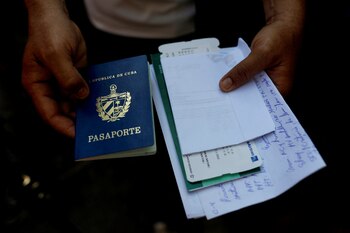
The U.S. Embassy in Cuba announced on Wednesday that it will resume issuing visas for migrants from May, a service suspended since 2017 due to “health incidents” that have not yet been clarified.
The information specifies that it will prioritize “IR-5 applicants (parent of U.S. citizen)” and that applicants “after April 1, 2022 will have their interview scheduled at the Embassy in Havana, not at the Embassy in Georgetown (Guyana).”
Otherwise, before that date, “they will continue to be prosecuted at the Embassy in Georgetown.”
“We don't have an exact date when the Havana Embassy will begin processing the full range of immigrant and non-immigrant visa services,” the diplomatic representation said on its website.
The US Chargé d'Affaires in Cuba, Timothy Zúñiga-Brown, announced on March 3 that they would begin processing visas for migrants as part of the “gradual expansion” of activity consular, albeit in a “limited” manner and without fixed deadlines.
The Cuban regime commented at the time that the news was “a step in the right direction” and recalled that these services were shut down in 2017 “as the first act of the (Donald) Trump government's hostility policy” (2017-2021).
The government of Republican Donald Trump closed the consulate in September 2017, arguing mysterious health incidents, described as sonic attacks, that affected US diplomats and were later reported in other embassies around the world.
The reactivation occurs amid an increase in the number of Cuban migrants trying to reach the United States through a route that starts from Central America and through the illegal route when trying to cross the Florida Strait.
Data from the US Customs and Border Protection Office (CBP) indicate that in the last five months a total of 47,331 Cubans entered the US country irregularly, with the figure reaching 16,557 in February alone.
The Cuban regime holds the United States responsible for the increased flow of irregular migration and has accused it of failing to comply with the agreements in this regard.

While many Cubans wait desperately for their family reunification visas and others process them by traveling to Guyana, thousands try other ways that are just as difficult and costly and even irregularly.
Many are doing so by air using Panama as transit and Nicaragua as a destination, but this week the Panamanian immigration authorities imposed a mandatory transit visa of $50, which prompted hundreds of islanders to concentrate on the Panamanian diplomatic headquarters to request that this measure be postponed.
Some also continue to try it through the dangerous jungle of Darién, on the Colombian-Panamanian border.
Under existing immigration agreements, the United States must grant 20,000 visas annually to Cubans.
(With information from EFE, AFP and AP)
Keep reading:
Últimas Noticias
Debanhi Escobar: they secured the motel where she was found lifeless in a cistern
Members of the Specialized Prosecutor's Office in Nuevo León secured the Nueva Castilla Motel as part of the investigations into the case

The oldest person in the world died at the age of 119
Kane Tanaka lived in Japan. She was born six months earlier than George Orwell, the same year that the Wright brothers first flew, and Marie Curie became the first woman to win a Nobel Prize

Macabre find in CDMX: they left a body bagged and tied in a taxi
The body was left in the back seats of the car. It was covered with black bags and tied with industrial tape
The eagles of America will face Manchester City in a duel of legends. Here are the details
The top Mexican football champion will play a match with Pep Guardiola's squad in the Lone Star Cup

Why is it good to bring dogs out to know the world when they are puppies
A so-called protection against the spread of diseases threatens the integral development of dogs




